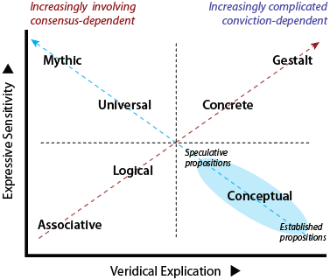Work, Capability and Role
Work Capability
You to make sense of reality so as to be responsible for changing it. This determines your , which is probably genetically determined.
is a specific personal ability which is not the same as measured IQ, skills, emotional intelligence, decision-style, leadership ability, or anything else. Unlike other performance factors, it is not teachable. Coaching or mentoring have no effect other than to create self-awareness.
![]() Comparison to IQ & Intelligence
Comparison to IQ & Intelligence
The 28 Levels in (described earlier) do not correspond to any social structure or any particular role. However, they do reflect increasing complexity and sophistication in handling reality.
Anyone can use any of these levels briefly to meet a personal need or to understand what is being said. However, that does not equate to the for structuring and altering reality in a particular way.
Simple observation reveals that:
-
the to do useful and effective work of any particular degree (level) of complexity varies markedly from person to person.
-
develops and increases through a person's working life, with moves up to a new level representing a major life-career transition.
-
people may move between : usually early in their career as they discover themselves, or late in life as they gratify themselves.
You need to get a sense of your own (independently of your choice of ), and track how it is developing. It can be difficult but you can definitely do it yourself. Don't be too persuaded by what others say: they tend to judge you by externals. The topics in this Satellite are designed to help you come to grips with this aspect of your inner nature (personal identity).
Factors in Role Performance
- Levels: Holding a position in an organization depends on having the appropriate . Posts or roles therefore need to be unequivocally defined in terms of and matched to a person whose capability is at that level.
-
Kinds: However, factors relating to the kind of work also determine whether you can responsibly perform a particular role, including:
- Expertise which improves with time and opportunity, and may be associated with developing a social network relevant to effective performance.
- Knowledge which can be acquired formally or informally via books, seminars, courses, coaching, mentoring &c.
- Skills which depend on training, continuing practice and refinement.
- Temperament and various personality traits, which may be largely inborn.
-
Paradigms: Some roles require use of a paradigm that may powerfully affect performance. Examples include paradigms that correspond to THEE mentalities, which are independent of either or kind of work. For example:
- mentality: see more here.
- mentality: see more here.
- mentality: see more here.
- mentality: as revealed in the —not yet posted.
Arena Choice
Different generate different kinds of work and roles. The focus here will be confined to and within the . The analysis of is about reality-handling, and therefore applies to all kinds of work found in the .
Work options within different may either attract or repel you. I do not know exactly what inner flexibility a person has. But we are certainly unwilling and even unable to perform in just any . The nature of commerce, politics, science, or art may seem too arcane or too difficult or too uninteresting. For better or worse, we leave that world to others and take for granted any benefits or harms that result.
Most of the generalizations about work and capability were determined by extensive research and consultancy in large conventional organizations that produce tangible goods and services: i.e. the .
Exactly how, and indeed whether, the findings identified in apply in the other 6 is a matter for investigation. The arena will be initially presented in detail. Each of the other domains will then be systematically explored and conjectures will be offered. At the end, findings can be reviewed and conclusions drawn.
As the inquiry proceeds, conjectures about all arenas will be maintained in Frameworks in Development, and summary findings will be updated there.
In exploring language use in endeavour, I noted that many, perhaps all, of us are able to use several of the methods at least to some limited degree. While the order of the Principal Typology apparently gives an indication of difficulty or complexity in relation to working, it was not viewed as relevant to difficulty in communicating.

This difficulty seems to be revealed by the Typology Essentials Table as shown here. Effective use of methods that are very high on either axis is difficult: few seem to use and well and these are high in the hierarchy too. However, the easiest methods seem to be and (which are nearest the origin), yet these two are rather far apart when it comes to .
Communicating has always been an issue at work. More recently, the rise of social media has put a premium on language for those in sales as well as top management. ![]() More
More
However, even if a salesman is pressured to use language with a prospect, back in the office he operates with language to handle his boss and subordinates. A CEO handles a television interviewer with language, but discusses financial issues with his Chief Finance Officer using language.
Something similar applies in writing manuals, which require proficiency in the use of : rather high in the TET but down at the bottom of the 28-Level system. The creation of the manual must be sharply distinguished from the handling of that project with a boss and co-workers. At the very least, is required to handle the work-role.
-
Because we live in a physical reality and consume resources within a particular society, there is always «ordinary work» that has to be done, however lofty our mission. Explore this notion further.
Originally posted: 25-Oct-2013